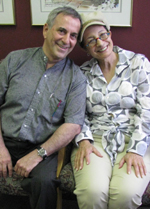|
By
Dawn Brazell
Public Relations
Avri Beeri knows his
research.
He can tell you everything
there is to know about Alzheimer's disease—about the myriad of clinical
trials, the vitamins and supplements thought to slow the process, and
how he helped his wife to be part of an elite group of only 50 people
who will be in Phase 2 of the CERE-110 clinical trial. He can tell you
what it's like to live with a spouse who suffers from a disease that
requires him to be watching with "10 eyes all the time what is going
on."
 Avri and Dvora Beeri Avri and Dvora Beeri
He smiles lovingly at
Dvora, his wife of 44 years, who has returned to MUSC for a check up
following her brain surgery March 29, where she may have received gene
therapy as MUSC's first patient to enroll in the trial. Their hope is
that this therapy will stop and possibly even improve her condition.
Sporting a new cap to
cover her closely-cropped hair, Dvora smiles at her husband. "I just
need to remember," she said of her decision to enter in a double-blind
clinical study that required her to have a portion of her head shaved
for a treatment she may or may not have received when she underwent
surgery.
Beeri nods at his wife's
response. He needs to know he did everything he could to help her do
just that.
He's the memory keeper for
both of them now. Beeri met his wife when he went to take music lessons
from her brother. "He invited me to come home with him, saying 'I will
teach you some lessons.' I never learned how to play the guitar,
but I learned her," he said, smiling.
Beeri found out his wife
had Alzheimer's disease four years ago, when his life researching the
disease began. He reads everything he can trying to find out what can
break the cycle and stop the disease. "I'm constantly Googling all over
the world to find out what study she could go on."
When he ran across the
nerve growth factor research, he knew he wanted to get her into a
study. On a wait list at Duke University, the couple decided to move
forward with doing the clinical trial at MUSC, where they had
participated in a previous study.
"I was following it very
closely to see where it was going to be, and when I found out it was
going to be here, I thought, 'Good, I know these people.'"
Beeri said they've been to
MUSC so much, his car comes on auto-pilot now. The decision to
participate in the trial was simple for him, but not as much for Dvora.
"She was the one who had to be drilled," he said of the holes that
surgeons have to make for the patient to receive the gene therapy. "I
told her, 'If I were the one who had it, I would do it.' If anything
could stop it, it's worth trying it even with all the pain."
Consulting with their
internist in Charlotte, Beeri said he was relieved it took the doctor
10 seconds to advise to do it. "We talked to him together. He said he
would do it for himself."
Dealing with the disease
takes patience. He advises other caregivers to know how fast the
research changes and how much more there is to know about how to help
those who suffer from the disease. If his wife had the "sham" surgery,
he wants her to get the gene therapy should the trial show promising
results.
Beeri knows it might not
work, but still thinks it was worth doing.
"It will help for the
future, even if it doesn't help us right now."
|



 Avri and Dvora Beeri
Avri and Dvora Beeri